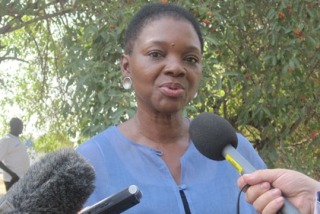Oil stoppage will leave more needing aid in South Sudan: UN
February 3,2012 (BOR) – The UN’s humanitarian affairs and chief, Valerie Amos, said that humanitarian conditions for many in South Sudan remain extremely precarious, and warned that the newly independent country’s oil shut down will cause more aid dependency.

Clashes along the country’s disputed border with Sudan that have forced tens of thousands of people to flee into South Sudan. Rebellions and violence between rival ethnic groups pose a significant threat to the lives and livelihoods of civilians, as recent violence in Jonglei State has shown.
The UN also expects that up to 700,000 South Sudanese may soon return to the country, as after April North Sudan will treat them as foreigners unless they acquire a work permit.
The lack of a functioning South Sudanese embassy in Khartoum is making this harder to Southerners who have remained in the north. Since late 2010, 360,000 Southern Sudanese returned to the country, which became independent in July last year, as part of a peace deal in 2005 that ended decades of conflict.
The returnees and displaced people and widespread food insecurity mean that much of the South Sudan’s population are vulnerable, the UN says.
“People should be helped to return in safety and with dignity,” Amos said according to a UN press release.
In her meetings with representatives from the ruling Sudan People’s Liberation Movement (SPLM), Amos stressed the importance of partnership between Juba and the international community to meet the significant needs of the South Sudanese people.
“The problems are enormous,” she said. “They can only be solved if we all work together. There is no other way.“
The UN and its partners have requested US$763 million in the 2012 appeal for South Sudan, covering 271 projects among 110 organisations.
“We need this to be adequately funded early in 2012 to ensure we meet our commitments to the people of South Sudan,” she stressed.
“If the necessary supplies are not purchased and pre-positioned in affected areas before the rains in the next months, if we do not boost the capacity of the humanitarian community and if the Government’s capacity is not further scaled up, the consequences for people in need could be dire,” she warned.
OIL DEPENDENCY
On Friday, Reuters reported that Amos said Thursday that South Sudan’s decision to shut down its oil output would result in more people becoming dependent on food aid.
Last week the landlocked country stopped its oil production in protest against North Sudan seizing some of its oil over a dispute about transit fees for the use of the north’s infrastructure.
African Union sponsored talks have failed to bring a deal between the two sides and although talks are due to start again next week a deal seems unlikely.
Both countries will suffer from the oil stoppage. Around 98% of South Sudan’s budget is from oil but Khartoum is also feeling the economic consequences of loosing 75% of its oil when South Sudan seceded.
“The situation in the country is extremely precarious, and the risk of a dangerous decline is very real,” Reuters quoted Amos as saying.
One in three South Sudanese will need food aid this year according to the UN’s World Food Program.
This year there will be an earlier and “longer season of hunger” than the previous year, Amos said late on Thursday after visiting Pibor in Jonglei state, a town that was badly affected by tribal violence over December and early January.
Around 6,000 armed men from the Luo-Nuer ethnic groups attacked the Murle tribe in the latest of a series of increasingly violent cattle raids and counter attacks. The Murle responded by attacking Nuer and Dinka areas of Jonglei state.
Amos said that 140,000 people have been affected by the conflict and require assistance, 20,000 more than previously estimated. The Juba government have described Jonglei as a disaster area.
“It is a terrible situation. People have lost loved ones, their possessions, and their livelihoods,” she said.
“If oil production is shut down, many people will feel the effects; humanitarian needs will inevitably increase, and the combined efforts of the government, the aid community and the donors will not be enough,” Amos told Reuters.
“The whole world is concerned that the talks between Sudan and South Sudan have broken down in the way that they have. Peace, security and stability is what the people of Sudan and South Sudan need.”
Before South Sudan broke away in July oil revenues were split 50:50, a key part of the 2005 wealth and power sharing agreement.
However, Khartoum now want South Sudan to pay $32 per barrel transported through their pipes and refineries and out of Port Sudan on the Red Sea. They also want Juba to accept some of the country’s external debt of $38 billion.
Juba has previously shown little interest in sharing the debt and say it is wiling to pay around $1 a barrel on the 350 barrels a day that South Sudan exported before the current crisis.
The SPLM government says it will take less than a year to build a new pipeline to Kenya claiming that the country will be able to last until the new infrastructure through East Africa is complete.
Even before the oil dispute and the Jonglei crisis the capacity of humanitarian agencies was “already extremely stretched” Amos said, adding that there were challenges “in terms of raising money for air operations, because the transport system is really non-existent, you’re not able to bring in food and other supplies by road”.
Apart from oil, and debt the two countries have yet to demarcate the disputed joint border, and find a solution to the whether the disputed oil-producing and fertile region of Abyei belongs in North or South Sudan.
(ST)
